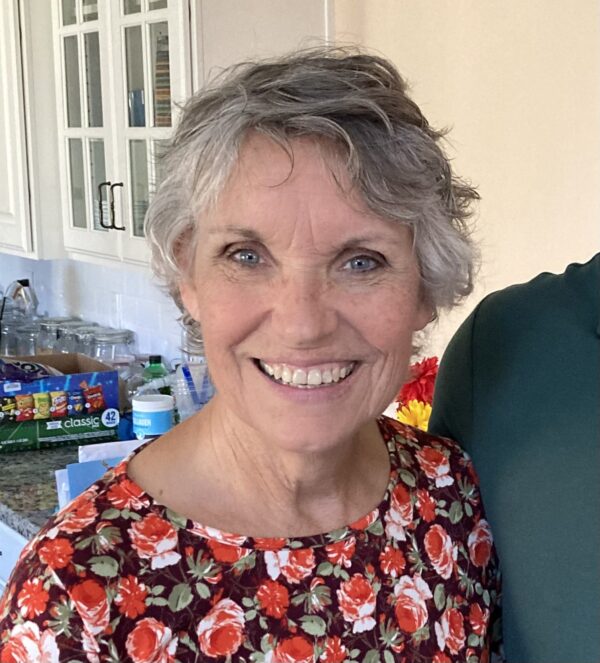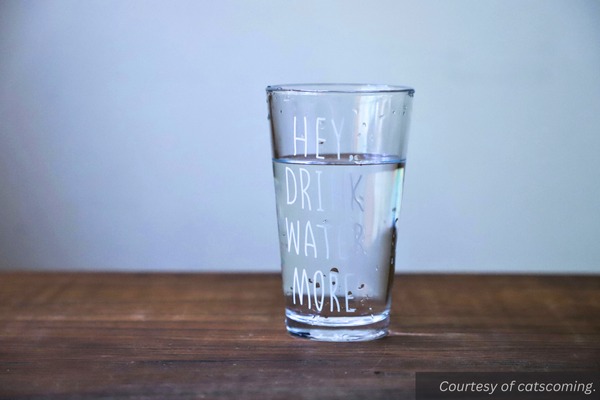“Water Is Essential, so Drink Up!” is part of a monthly column of mental health articles by Karen Munson. Read the previous article, “Get a Massage,” at the link.
Imagine your body as a container, a tall, elegant vase, or a sturdy ceramic jug — whatever feels right. Picture yourself being filled with rippling spring water bubbling up through purifying rocks or a waterfall cascading from above. We are all literally vessels of water.
Since our bodies are more than 80% water, water is essential to our health. Healthcare professionals recommend that we drink at least half our body weight in ounces each day for daily living. One source says that it takes three weeks of drinking that optimal amount to become fully hydrated. Why is being hydrated important?
Water helps carry nutrients and oxygen to all your cells; it helps regulate your body temperature; it cushions your joints; it stabilizes your heartbeat; it normalizes your blood pressure; it aids in digestion; it protects your organs and tissues; it helps prevent constipation; it flushes bacteria from your bladder; it helps balance electrolytes in your body; it helps you have enough energy; it increases brain performance; it treats and prevents some headaches; it helps with weight loss, and it boosts your skin’s health. Plenty of reasons.
It is one of the most plentiful materials on Earth. Water is life; no water, no life. Nothing in the world is softer than a cloud of water droplets and yet so hard that it conquers rock. Most substances contract when they freeze, but water expands. A plant seed, composed of water, can burst through asphalt.
Water is the only substance on planet Earth that exists in all three forms: solid, liquid, and gas. The land we live on is shaped by water. Liquid water can rise hundreds of feet in the tallest trees. Amazing, right? And you are mostly water.
Yet, all water is not the same. Spring water, tap water, ocean water, pond water, etc., each have their own signature composition. Drinking water varies a lot, too. A lab technician I met lined commercial water bottles on his shelf organized by quality from lowest to best. Some were simply tap water in a bottle, and others were pure spring water. It makes a difference.
Some cities have ‘closed’ water systems, meaning the same water is circulated repeatedly within the same pipes. It comes out of a faucet, is used, goes down a drain, and then is processed with chemicals to be used again.
Though most water looks the same — an innocent, clear liquid — it contains chemicals such as fluoride and chlorine, calcium carbonate and other minerals, nitrates, microbes, pollution, etc.
Some of these can be filtered through charcoal and reverse osmosis filters that can be applied to septic systems or home systems. There are a plethora of options out there. Each municipality and each water system is different. Even within the same community, iron levels in local wells differ, so there is no one-size-fits-all solution to finding the best water to drink.
A scientist named Masaru Emoto in Japan postulated that water had energy. His research indicated that water could be purified by applying gratitude and positive thoughts. See our article in the previous issue of the Byway about the power of words. However, not all scientists agreed with Dr. Emoto.
The point here is to be mindful of how much and what kind of water you consume. Water is a source of communication between your cells, a lubricant, and a cleanser, among other functions. You will want to ensure you have what is best for you. Over time, it makes a difference.
– by Karen Munson

Karen M. Munson – Escalante
Karen is an associate editor at The Byway. She is fascinated and fulfilled by all things involved with writing. After graduating from BYU, she taught English at Escalante High School for three years. She pursues opportunities to write and support others in their writing. Karen has published three books with four more scheduled to be released in 2024. She and Reed are the parents of ten children and the grandparents of 35 grandchildren.
Karen is the author of the New Twist on Mental Health column in The Byway.

